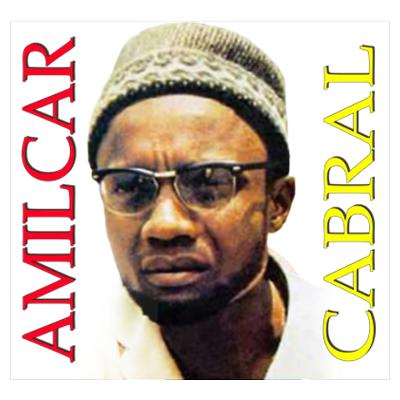
| COLOURS, RACES AND RELIGIONS ARE NOT OUR MATTERS ! |

AMILCAR CABRAL
Amílcar Cabral soon realized that the war effort could be sustained only if his troops could be fed and taught to live off the land alongside the larger populace. Being an agronomist, he taught his troops to teach local crop growers better farming techniques, so that they could increase productivity and be able to feed their own family and tribe, as well as the soldiers enlisted in the PAIGC's military wing. When not fighting, PAIGC soldiers would till and plow the fields alongside the local population.
 |
Amílcar Lopes da Costa Cabral ( (1924-09-12)12 September 1924 – 20 January 1973(1973-01-20)) was a Guinea-Bissauan and Cape Verdean agricultural engineer, writer, and a nationalist thinker and politician. Also as Abel Djassi, Cabral led the nationalist movement of Guinea-Bissau and Cape Verde Islands and the ensuing war of independence in Guinea-Bissau. He was assassinated on 20 January 1973, about 8 months before Guinea-Bissau's unilateral declaration of independence. While he was influenced by Marxism, he was not a Marxist. He was born on September 12, 1924 in Bafatá, Guinea-Bissau, son of Cape Verdean father, Juvenal Lopes da Costa Cabral and Guinea-Bissauan mother Iva Pinhel Évora. Cabral was educated at Liceu (Secondary School) Gil Eanes in the town of Mindelo, Cape Verde, and later at the Instituto Superior de Agronomia, in Lisbon which was then the colonial power ruling over Guinea-Bissau and Cape Verde). |
While an Agronomy student in Lisbon, he founded student movements dedicated to opposing the ruling dictatorship of Portugal and promoting the cause of liberation of the Portuguese colonies in Africa.
He returned to Africa in the 1950s, and was instrumental in promoting the independence causes of the then Portuguese colonies. He was the founder (in 1956) of the PAIGC or Partido Africano da Independência da Guiné e Cabo Verde (Portuguese for African Party for the Independence of Guinea and Cape Verde) and one of the founders of Movimento Popular Libertação de Angola (MPLA) (later in the same year), together with Agostinho Neto, whom he met in Portugal, and other Angolan nationalists.
|
From 1963 to his assassination in 1973, Cabral led the PAIGC's guerrilla movement (in Portuguese Guinea) against the Portuguese regime, which evolved into one of most successful wars of independence in African history. The goal of the conflict was to attain independence for both Portuguese Guinea and Cape Verde. Over the course of the conflict, as the movement captured territory from the Portuguese, Cabral became the de facto leader of a large portion of what became Guinea-Bissau. In preparation for the liberation war, Cabral set up training camps in neighboring Ghana with the permission of Kwame Nkrumah. Cabral trained his lieutenants through various techniques, including mock conversations to provide them with effective communication skills that would aid their efforts to mobilize Guinean tribal chiefs to support the PAIGC. |
Amílcar Cabral soon realized that the war effort could be sustained only if his troops could be fed and taught to live off the land alongside the larger populace. Being an agronomist, he taught his troops to teach local crop growers better farming techniques, so that they could increase productivity and be able to feed their own family and tribe, as well as the soldiers enlisted in the PAIGC's military wing. When not fighting, PAIGC soldiers would till and plow the fields alongside the local population.
Cabral and the PAIGC also set up a trade-and-barter bazaar system that moved around the country and made staple goods available to the countryside at prices lower than that of colonial store owners. During the war, Cabral also set up a roving hospital and triage station to give medical care to wounded PAIGC's soldiers and quality-of-life care to the larger populace, relying on medical supplies garnered from the USSR and Sweden. The bazaars and triage stations were at first stationary until they came under frequent attack from Portuguese regime forces.
In 1972, Cabral began to form a People's Assembly in preparation for the birth of an independent African nation, but disgruntled former PAIGC rival Inocêncio Kani, with the help of Portuguese agents operating within the PAIGC, shot and killed him before he could complete his project. The Portuguese regime's plan, which eventually went awry, was to enjoin the help of this former rival to arrest Amílcar Cabral and place him under the custody of Portuguese authorities. The assassination took place on 20 January 1973 in Conakry, Guinea. His half-brother, Luís Cabral, became the leader of the Guinea-Bissau branch of the party and would eventually become President of Guinea-Bissau.
More than a guerrilla leader, Cabral was highly regarded internationally as one of the most prominent African thinkers of the 20th century and for his intellectual contributions aimed at formulating a coherent cultural, philosophical and historical theoretical framework to justify and explain independence movements. This is reflected in his various writings and public interventions.


